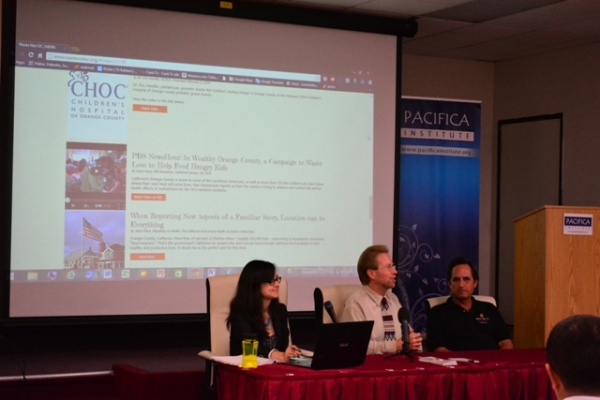On Monday, November 3rd, Pacifica Institute partnered with Waste Not OC Coalition, Orange County Food Bank, Orange County Health Care Agency, and Embrace Relief for a panel discussion on Tackling Food Insecurity in Orange County. Our guests were Dr. Eric Handler, the Public Health Officer for Orange County, Mark. A. Lowry, Director of the Orange County Food Bank Community Action Partnership of Orange County, and Bernadette Garcia Silva, Project Manager at Waste Not OC Coalition.
In August 2006, Dr. Handler was appointed Orange County Health Officer. When he learned that Orange County ranks in the Top 10 in the nation for food insecurity, he recognized that this was an issue he absolutely needed to address. In 2012, alongside Orange County Food Bank CEO Mark Lowry, he founded the Waste Not Orange County Coalition, a public-private partnership formed to “reduce hunger and solid waste by facilitating the donation of wholesome surplus food.” During Mark Lowry’s twenty-two-year tenure, the quantity of food distributed by the Food Bank has grown from two million pounds per year to nearly 20 million pounds annually. Over 150,000 vulnerable people now receive food from the Orange County Food Bank each month.
Dr. Handler informed us that fifty percent of the homeless population in the United States is under ten years old. Orange County, even though it is one of the wealthiest counties in the United States, is among the Top 10 in the nation for food insecurity, with 400,000 residents not knowing where their next meal will come from. The National Institutes of Health note that a lack of nutritious food can have long lasting side effects, such as anemia, diabetes, and obesity. Forty percent of all food in the United States is thrown away. Mr. Lowry states that if you take all the food that is thrown out and redirect it, that would end hunger in Orange County. So that is what Dr. Handler and Mr. Lowry set out to do. The Waste Not OC Coalition began in November 2012, and already 18.3 more tons of food have been generated as a result of the Food Recovery Task Force.
One major deterrent restaurants have for donating is being afraid of the liability in the event that someone gets sick. However, under the Good Samaritan Law, food providers are not held liable if the donated food is prepared safely and correctly. Donations come from not just restaurants but a variety of sources, including theme parks, hospitals, and schools. Waste Not OC has a three prong attack. First, ensuring that restaurants and grocers understand the task is possible. Second, identifying those that are suffering from food insecurity. And third, getting more food from food pantries to families in need.
The Food Bank services 375 other charities in Orange County. As traditional resources such as big company donations decrease, they had to get creative in finding new resources. The Prepared and Perishable Food Program connects restaurants, theme parks, hospitals and schools with food recovery agencies, who connect those in need with pantries that provide wholesome food. The Waste Not OC Coalition also trains and educates potential donors to safely handle donated food.
Pacifica Institute would like to thank our speakers for this informative and inspiring lecture. We also thank our guests for their interest in ending food insecurity in Orange County. For more information on how to get involved, please visit www.wastenotoc.org

